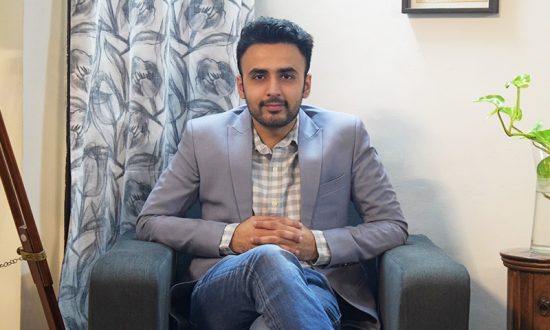Born in a family of fair traders from Delhi, it was not a tough call for Leo Shastri to follow the family’s rich legacy as he always feels strongly for injustice, prejudice and poverty. After studying filmmaking and working on various small projects in different industries like education and entertainment, Shastri finally decided to go back to his roots and dedicate his near future to the Usha Exim Private Limited. Intending to reach new heights and create work opportunities for the economically disadvantaged section of the society, he joined the certified fair-trade multi-product export organisation as a Director of Operations & Strategy.
The ongoing pandemic has led to unprecedented disruptions in the supply chain, upsetting the flow of goods and material across several sectors and businesses. While this disruption can be attributed to what is legally termed as force majeure, unfair trade practices mustn’t be resorted to under cover of the pandemic. If that happens, it most likely impacts the weakest and those lying at the bottom of the value chain as also the end-consumer.
What is free and fair trade?
In a perfectly free and fair trade economy, a harmonious balance between the interests of each section including the small producers, farmers, artisans, labour and workers is achieved in an environmentally responsible manner while raising end-consumer awareness of the issues involved in the whole value chain. At the same time, it is ensured that the common man has access to the widest array of goods and services at the most competitive prices.
Legally speaking, according to Competition Act 2002, no anti-competitive agreement can be allowed to be made with the aim of directly or indirectly determining purchase or sale prices; limiting or controlling production, supply, markets, technical development, investment or provision of services; sharing the market or source of production by way of allocation of the geographical area of market; or directly or indirectly indulging in bid-rigging or collusive bidding – through forming of a cartel.[1] This would amount to anti-competitive practices. Further, the abuse of dominant position entails predatory pricing, limiting production/market or technical development, creating entry barriers, applying dissimilar conditions to similar transactions and denying market access and using a dominant position in one market to gain advantages in another market.[2] The act also entails regulating combinations that occur by way of mergers and acquisitions. It is the Competition Commission of India’s mandate to regulate any practices that might have an appreciable adverse effect on competition (AAEC).
Why is free and fair trade critical during COVID-19?
By most accounts, small businesses have been hit the most due to COVID-dictated lockdown and restricted social distancing practices. Therefore, any business practice that violates their right to be a participant in the value chain must be reined in. It is a different matter altogether that many small businesses have been forced to close down not because of any anti-trust or monopolistic practices by competitors but by their inability to navigate through the falling demand landscape as also due to the broader slowdown in the economy. However, it is from the consumer standpoint that the importance of fair-trade practices was most realised during COVID-19. It is the pressing need for essentials including COVID-related products such as sanitisers, masks, ventilators, PPE besides food and medicine which necessitated for the authorities to be at their vigilant best in order to ensure that there is no shortage of such materials and that they are available at reasonable prices throughout the country.
Widespread reportage on shortage and overpricing
Nonetheless, despite the authorities’ best intent, there has been extensive reporting in the press as to how there had been a shortage of essentials such sanitisers, N-95 masks and other similar COVID-related items and how they were being sold at skyrocketing rates, especially in the early days of the pandemic. So much so that the government had to step in and place hand sanitisers and masks under the purview of the Essential Commodities Act. In a similar vein, when there was an uproar over reported artificial shortages, black marketing and overpricing of Remdesivir, the most potent yet investigational drug against COVID-19 so far, the Directorate General of Health Services (DGHS) had to intervene directing all states to keep a strict vigil against such possible infractions.
Crisis cartels or Good Samaritans: collaboration a double-edged sword
Given the nature of the pandemic and for reasons of speed and urgency, it is entirely possible that companies might need to collaborate with one another and even erstwhile competitors with a view to ensure that supplies are made in time and to the desired destinations. However, in the name of collaboration for the public good, it is also possible that they might forge unethical collusive arrangements exercising their existing market power with the aim of unfairly influencing the prices and supplies of an essential good. This collusion could span both horizontal as well as vertical arrangements with an eye on cutting out undesirable competition from the market. For instance, a few could band together to prioritise suppliers to the unfair exclusion of some genuine could-have-been and willing suppliers, thereby gaining underserved market advantage. Exploiting the very crisis-ridden nature of the pandemic, competitors could stitch together what is often called crisis cartels while pretending to come together for the larger public interest. In this, competitors often agree amongst themselves as to how to cushion the impact on their businesses by tacitly concurring not to undercut each other’s prices. In light of COVID, when pharma and hygiene and sanitation product manufacturers collaborate, they have to make sure that they don’t fall foul of anti-competition laws.
Although not directly related to COVID, the recent news of All India Online Vendor’s Association comprising more than 2000 sellers filing a case against Amazon for anti-trust violations wherein the e-commerce behemoth was alleged to have unfairly favoured some retailers with unethical discounting practices thereby driving independent vendors out of business. In February this year, an anti-trust case was filed against internet giant Google for unfairly promoting its mobile payments app, demonstrating an abuse of dominant market position.[3]
Therefore, even as the battle against COVID continues, the government so far has not made any relaxations with respect to anti-fair trade/competition laws. Indeed, CII has issued a few guidelines so as to ensure that the companies remain on the right side of the law. There have been some noteworthy adaptations to anti-trust provisions in the US, and UK India could take a leaf out of. For instance, collaborations between competitors in terms of R&D, sharing of technical know-how and standards of patient management [4] with a view to stem the shortage in supplies of essentials, including medicines, would not attract anti-trust provisions. As long as the intent and the act are bona fide and are committed in the larger public interest, the government could take a soft view. The bottom line is that the access to essentials and the larger public health should not be compromised in any way. And so the government must maintain utmost vigil right through COVID.
More about Leo Shastri

As the Director of Operations & Strategy, Leo Shastri’s role is to ensure everyone is doing their job well right from accounts & logistics to quality control of production. Besides that, he also manages all aspects related to the growth of the organisation and its expansion as well as implementation plans. The inheritance of his grandfather, Late Prof. Shyam S. Sharma –who was called ‘The Father of Fair Trade in Asia’– always inspires him to do something extra-ordinary for the society because he has grown up hearing about the beautiful concept of ‘World Family’. He still remembers how his grandfather used to tell him that the whole world is our family, challenged with injustice, prejudice and poverty, and our target would be to remove miseries from our world.
An avid fair trader, his goal as an entrepreneur, is to eradicate poverty and unfair practices in society through alternative trade methods. He would like to believe in the motto ‘Entrepreneur for a cause’. In his free time, he travels from village to village to explore the human diversities across India and understand the rural mindset. His initiatives made him and his company win many laurels which include India 500 Quality Leader Award 2020 for Quality Excellence and India 5000 Best MSME Award 2020 for Quality Excellence.
[1] https://www.cci.gov.in/sites/default/files/cci_pdf/competitionact2012.pdf
[2] https://www.cci.gov.in/sites/default/files/advocacy_booklet_document/FAQ.pdf
[3] https://www.business-standard.com/article/companies/google-faces-antitrust-case-in-india-over-promote-payments-app-report-120052700939_1.html
[4] https://www.mondaq.com/india/cartels-monopolies/937194/covid-19-spotlight-on-the-competition-law-regime-in-india-


